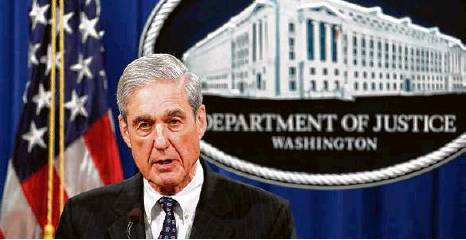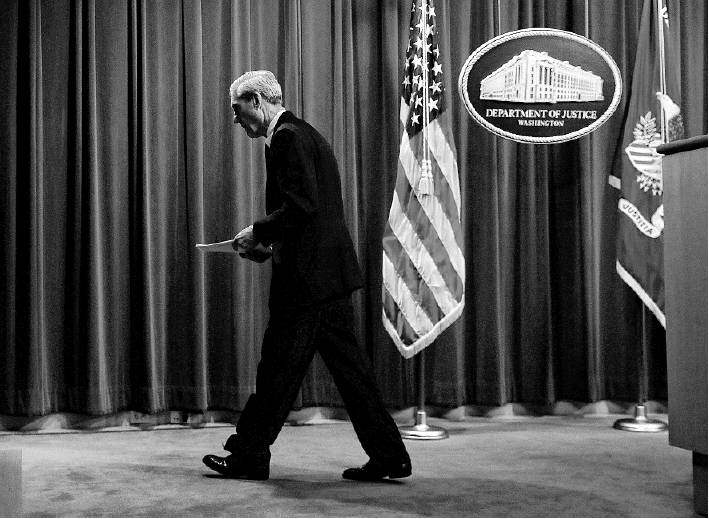Final word restarts impeachment tiff
Breaking his silence before retreating to private life, Mueller doesn’t clear Trump of obstruction
By Sharon LaFraniere NEW YORK TIMES
WASHINGTON — Robert Mueller, the special counsel, declined Wednesday to clear President Donald Trump of obstruction of justice in his first public characterization of his two-year investigation of Russia’s interference in the 2016 presidential election.
“If we had had confidence that the president clearly did not commit a crime, we would have said so,” Mueller said, reading from prepared notes behind a lectern at the Justice Department at a hastily called appearance.
He also noted that while Justice Department policy prohibits charging a sitting president with a crime, the Constitution provides for another remedy to formally accuse a president of wrongdoing — a clear reference to the ability of Congress to conduct impeachment proceedings.
Although it lasted less than 10 minutes, the news conference presented an extraordinary spectacle of a top federal law enforcement official publicly stating that the president’s conduct had warranted criminal investigation, even though it was impossible to indict him for any crimes. Mueller delivered his statement on his last day as special counsel, saying it was his final word on his investigation and he was returning to private life.
Democratic presidential candidates immediately seized on Mueller’s refusal to exonerate Trump to call for the president’s impeachment, intensifying pressure on Speaker Nancy Pelosi, who has insisted impeachment proceedings would only play into Trump’s hands.
The president’s aides and allies tried to cast the event as not even newsworthy, just a summary of a 448-page report released weeks ago. Mueller “has closed his office and it’s time for everybody to move on,” said Sarah Huckabee Sanders, the White House press secretary.
Mueller, 74, who carried out the entire investigation without a word, walked stiffly to the lectern and began tentatively, then delivered a succinct distillation of his investigation that was distinctly more powerful than the often legalistic language of his two-volume report.
He seemed to cast the president’s conduct in a more damning light than Attorney General William Barr did when he discussed the investigation’s findings at a news conference in April and at a subsequent Senate hearing. Barr said Trump was not guilty of “obstructive conduct.” He also suggested that the president may have been merely acting from frustration, not corrupt intent, when he tried to interfere with the special counsel’s investigation, including when he tried to oust Mueller.
Mueller, by contrast, stressed the gravity of the allegations against the president. Although he noted that his office did not “make a determination as to whether the president did commit a crime,” he said, “the matters we investigated were of paramount importance.”
“When a subject of an investigation obstructs that investigation or lies to investigators, it strikes at the core of their government’s effort to find the truth and hold wrongdoers accountable,” he said.
Barr suggested at one point that the special counsel should not have collected evidence against Trump if he intended only for Congress to review it. But Mueller defended his inquiry as wholly justified.
While charging the president with a crime was “not an option we could consider,” he said, it was important to collect and preserve evidence and to hold accountable anyone who might have conspired with the president and could face criminal charges. He also referred to the impeachment process, a point that is reduced to a footnote in his report.
“The Constitution requires a process other than the criminal justice system to formally accuse a sitting president of wrongdoing,” he said. He cited the same opinion from the Justice Department’s Office of Legal Counsel that states that asitting president cannot be criminally charged.
He added that the order by the former deputy attorney general, Rod Rosenstein, appointing him as special counsel specifically authorized him to investigate actions to interfere with his inquiry. He also noted that he kept Rosen-stein apprised of his team’s work.
Mueller stressed that he would not comment further on the actions of the Justice Department or Congress. He suggested that Democrats in Congress were wasting their time in seeking his testimony because he would simply repeat what he stated in his report. “The report is my testimony,” he said.
He added: “I am making that decision myself. No one has told me whether I can or should testify or speak further about this matter.”
White House officials and the president’s private lawyers both pointed to Barr, not Mueller, as the most important arbiter of the president’s conduct. After Mueller declined to decide whether the president was guilty of a crime, Barr decided that evidence against the president was insufficient to warrant a criminal prosecution — a decision he reached with Rosenstein.
“We consider this case closed,” Sanders told reporters. She said that further investigations by Congress were unnecessary because “it’s already been done.”
Congressional Democrats said Mueller’s remarks only underscored the need for Congress to follow up with subpoenas and hearings.
“If he had any evidence that the president was not guilty, he would have let us know,” said Pelosi. “But he didn’t. He didn’t. And Ithink that was very, very important.”
She said Congress should continue to press for more information, including for passages in the report that were redacted to protect grand jury material, current criminal investigations or classified information.

